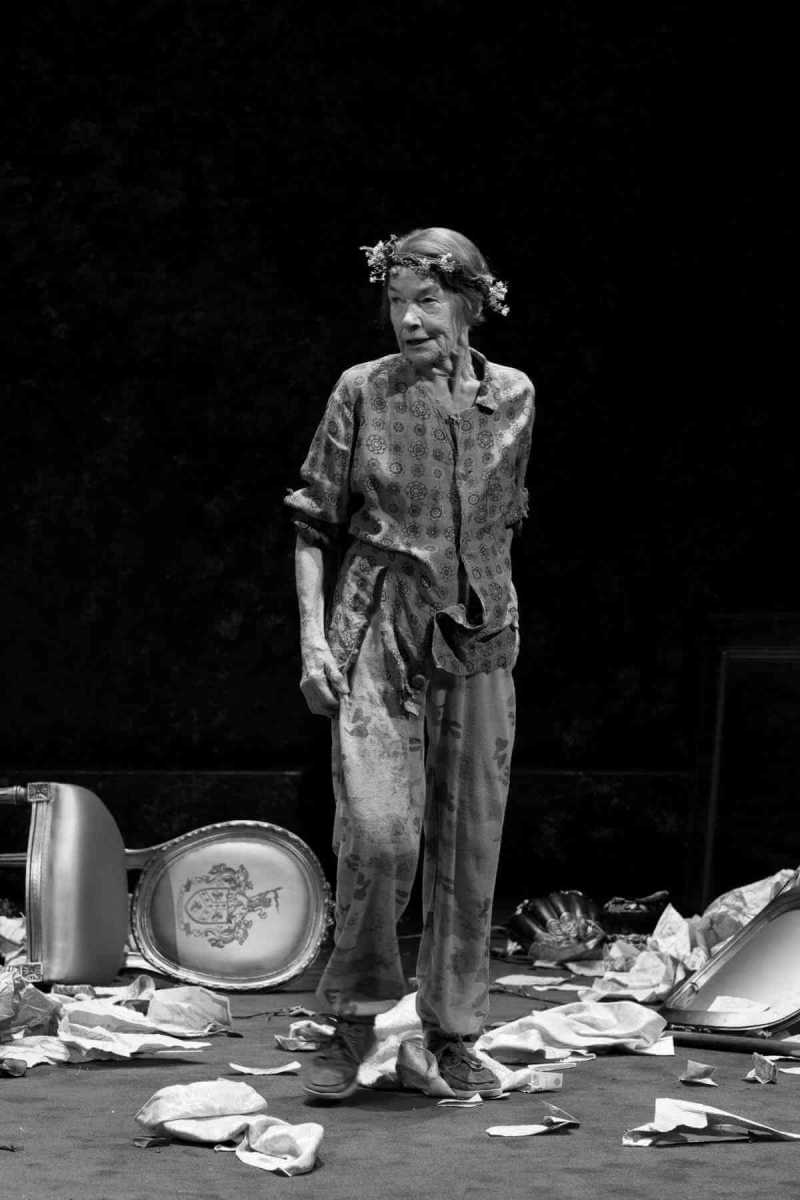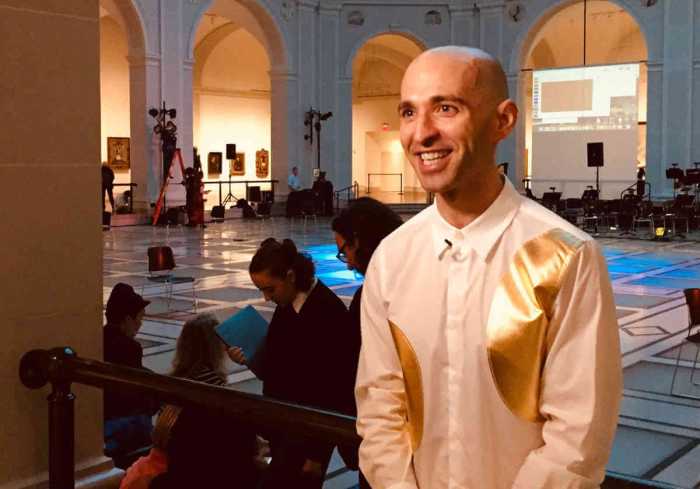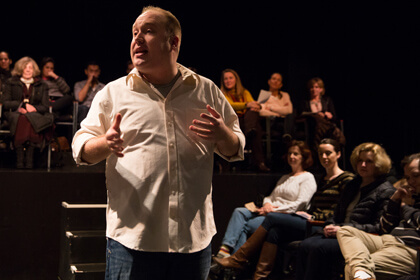Shakespeare is ever adaptable to the times, and so Sam Gold’s production of “King Lear” seems tailor-made for our Trumpian times. It’s garishly, gaudily gilded, garrulous, and gruesomely gory in telling the tale of a kingdom beset by chaos, power struggles, betrayals, shifting allegiances, and ultimately destruction. Sadly, it is also largely incoherent, unfocused, and rambling over its three-and-a-half-hour course.
At the center of it all is the wonderful Glenda Jackson. That she has taken on one of the theater’s most complicated and demanding roles at the age of 83 is an impressive feat. The physical stamina and memorization alone required to undertake Lear would be daunting for most lesser actors. Under Gold’s direction, however, her depiction of a jealous monarch who divides his kingdom between two daughters, Goneril and Regan, while disowning a third, Cordelia, who is not sufficiently obsequious — touching off a civil war — seems like a gimmick rather than a deeper exploration of the play and the choice to cast a woman in an iconic male role. Jackson’s performance is characterized primarily by snarls, tics, and grimaces and swiftly become predictable and tiresome.
Gold often appears to work consciously against the text, hobbling the language’s lyricism and, so, flattening out the lead character and the production as a whole. There is an entire scene where the now-mad Lear encounters the Earl of Gloucester — after Gloucester has been blinded under the direction of Lear’s daughters and cast out into the wild — where Jackson seems to have no idea what Lear is talking about. The text’s natural arcs have been corrupted so confusion reigns. Yes, Lear has lost his senses, but compromising the cadence of the poetry robs it of its emotional heft, making it simple rambling.
The rest of the company scarcely fares better. Jayne Houdyshell, who like Jackson is a theatrical treasure, is lost as Gloucester. As with Jackson’s Lear, she assumes a kind of generic masculinity that never feels organic. Equally lost is Sean Carvajal as Edgar, Gloucester’s son who feigns madness to escape death when he is falsely accused by his bastard brother Edmund of plotting against their father. Edgar ultimately saves his father and becomes king, but Carvajal plays him as whiny and weak. The dichotomy between Edgar’s nobility cloaked as pretended madness and Lear’s descent into derangement is central to the play as written, but it is totally lost here. Elizabeth Marvel reduces the evil Goneril to a cartoonish cliché. Only Pedro Pascal as the illegitimate Edmund, a stock Shakespeare villain, seems to know what he’s really about, bringing clarity, sexuality, and grounding to his role.
The production values are remarkable. Miriam Buether’s gold set is a masterpiece of simplicity, particularly as lit by Jane Cox, and the original score by Philip Glass is rich and sophisticated. In the end, though, one can’t help but be reminded of the old saying about all that glitters.
In revisiting Arthur Miller’s wartime drama “All My Sons,” the biggest surprise is the realization that the play is set in a time when patriotism meant caring authentically about America and those who served it and unethical business practices were anathema to cultural norms. In other words, as this solid, workmanlike production currently at Roundabout makes clear, it is not the sort of greatness to which the nation is currently being exhorted to return.
Set in 1947, the plot concerns the Keller family. Joe Keller, the patriarch, runs a factory he rebuilt after a scandal involving defective parts shipped for the war effort that caused planes to crash. Joe’s partner is currently in jail, having taken the fall for the shipment, while Joe was cleared of wrongdoing. He and his wife Kate live comfortably in the Midwest. One son, Larry, disappeared during the war. Their other son, Chris, has returned home to run the factory. Chris plans to marry former neighbor Ann, who had been Larry’s girlfriend and is the daughter of Joe’s jailed ex-partner. Kate resents this, refusing to believe that Larry has died. The once-placid domesticity is further disrupted when Ann’s brother George shows up, opening old wounds and reawakening questions about responsibility for the tragedies the factory caused. The Kellers must, in the end, confront the truth they have largely suppressed.
The play’s obvious political implications for today justify its revival, but its gauzy nostalgia, simplicity, and moralism make it seem dated all the same. The production is solid, to be sure, with Tracy Letts, looking scarily like Dick Cheney, giving another masterful performance of bluster and denial as Joe. Annette Bening as Kate hits all the marks perfectly, giving the character a complexity and fragility at the emotional center of the play. Benjamin Walker as Chris slowly opens up to his own moral center, and his love for Ann and is consistently believable. Francesca Carpanini is excellent as Ann, who somehow finds a way to go on amidst the upheaval around her with a firm grasp on reality.
Under the direction of Jack O’Brien, on a gorgeous realistic backyard set by Douglas W. Schmidt and with period costumes by Jane Greenwood, the story’s sustained tension is palpable. The play is, it’s true, a little stilted to contemporary ears, but it’s worth noting that at least part of that is due to our nation having lost something important and elemental that no backward-looking revisionism can restore.

The best thing one can say about “Tootsie,” the new musical based on the 1982 hit movie, is that it is what it is. And what it is is an easily entertaining, traditional musical that makes few demands on its audience. The story, in which a “difficult” actor impersonates a woman so he can get work, has been transplanted from the world of soap operas in the movie to the Broadway stage in the book by Robert Horn. The storyline and groan-inducing, obvious jokes are reminiscent of middling musicals from the 1950s, but the time-tested formula is a proven crowd pleaser, and if the result is only a fairly diverting evening there’s certainly a Broadway market that wants to see favorite movies turned into musicals.
Put another way: “Hadestown” it ain’t.
David Yazbek’s score is not his best, lacking the sophistication and emotion of “The Band’s Visit” as well as the flash of “Dirty Rotten Scoundrels” and “The Full Monty.” But, like the rest of the show, it mostly gets the job done. Similarly, Scott Ellis’ direction and Denis Jones’ choreography serve the piece but deliver no special excitement.
The real payoff comes from the spectacular performance by Santino Fontana as actor Michael Dorsey and his alter-ego Dorothy Michaels. He lights up the stage whenever he’s on — which is virtually the entire show — and hits all the comedic and serious moments. Though the story’s woke, gender-sensitive adaptation is labored, Fontana carries it off naturally, never making it too cumbersome. His singing, movement, and sheer joy in the performance carry the show with irresistible star power. Fontana is supported by strong performances from Lilli Cooper as Julie, his co-star in the Broadway show, Sarah Stiles as Sandy, his crazy ex-girlfriend, John Behlmann as Max, a reality star turned actor, Reg Rogers as the egomaniacal director, and Andy Grotelueschen as Michael/ Dorothy’s roommate Jeff, whose sardonic take on the events places him as the “normal” one in a comedy that spins out of control.
Buckets of money have been spent on this production, with sets by David Rockwell, costumes by William Ivey Long, and lighting by Donald Holder. Special mention has to be made of the dressers and costume crew. Fontana’s quick changes are nothing short of marvelous and create real theatrical magic. In fact, everything about this production says that they’re in it for the long run.
KING LEAR | Cort Theatre, 138 W. 48th St. | Through Jul. 7: Tue.-Sat. at 7 p.m.; Wed., Sat. at 1 p.m.; Sun. at 3 p.m. | $35-$159 at telecharge.com or 212-239-6200 | Three hrs., 30 mins., with intermission
ALL MY SONS | American Airlines Theatre, 227 W. 42nd St. | Through Jun. 23: Tue.-Fri. at 8 p.m.; Wed., Sat. at 2 p.m.; Sun. at 3 p.m. | $59-$169 at roundabouttheatre.org or 212-719-1300 | Two hrs., 15 mins., with intermission
TOOTSIE | Marquis Theatre, 210 W. 46th St. | Tue.-Thu. at 7:30 p.m.; Fri.-Sat. at 8 p.m.; Wed., Sat. at 2 p.m.; Sun 3 p.m. | $79-$149 at ticketmaster.com or 800-745-3000 | Two hrs., 30 mins., with intermission





































